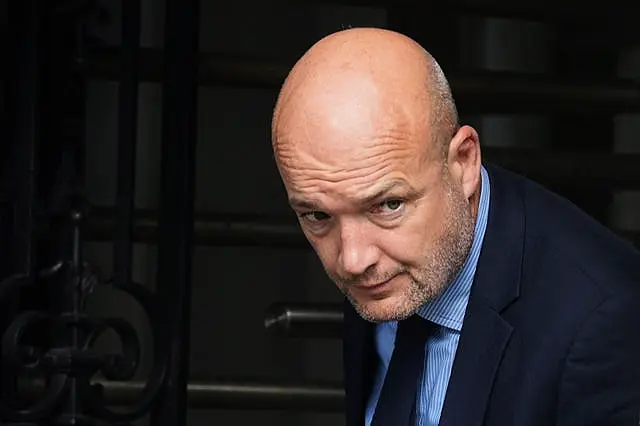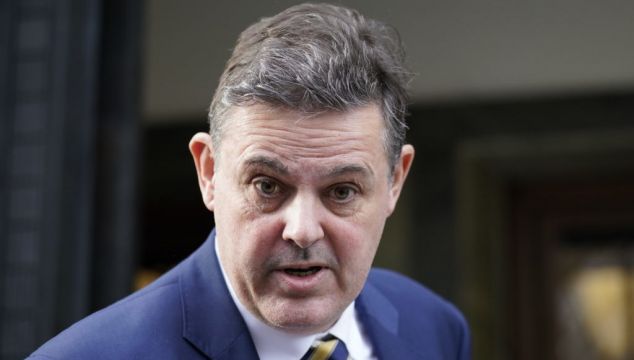RTÉ’s director-general has defended his decision to give an exit package to Rory Coveney, saying the national broadcaster could have been ordered to pay double the amount if the former strategy director had taken a wrongful dismissal case.
Kevin Bakhurst said there were “absolutely no grounds” to sack Mr Coveney, who was described as the “driving force” behind an ill-fated musical which lost the organisation €2.2 million.
Mr Coveney, the brother of enterprise minister Simon Coveney, received a package when he resigned and his role was made redundant in July last year – the same week Mr Bakhurst took the helm.
Mr Bakhurst said RTÉ expects to recoup the cost of the payment to Mr Coveney by July this year, leading to speculation the payment was approximately one year’s salary, or about €200,000.

Mr Bakhurst described Toy Show The Musical, which went ahead without formal board approval, as a “disaster”, but said: “It’s not all down to Rory Coveney.”
He added: “It was not enough on its own to fire him over. So if you can’t fire someone in a semi-state, you have to find another way of exiting them from the organisation in a way that provides value to licence-fee payers.”
Mr Bakhurst would not comment on the exact figure provided to Mr Coveney, but suggested that the organisation could potentially have paid out double what was given if Mr Coveney had taken a wrongful dismissal case with the Workplace Relations Commission (WRC), which the director-general said was typically about two years pay.
He said the amount paid out was also “considerably less” than Mr Coveney would have received under an RTÉ voluntary exit programme.

He told RTÉ’s Drivetime: “We’re not in America, you can’t just fire people willy nilly with no repercussions.
“You know, had I gone down that route, RTÉ would have a liability, which is substantially more than what we ended up paying.”
Mr Bakhurst also claimed on Monday that he had previously told reporters last year that Mr Coveney was given an exit payment.
When asked at the time if Mr Coveney had received an exit fee “going out the door”, Mr Bakhurst told reporters on his first day in the job that there was no “ex gratia” payment and added that it was not fair to talk about individuals.

He said: “He didn’t get a payment going out the door but he is entitled as other people are to statutory-level payments when they leave an organisation.”
Recalling the comment on Monday, Mr Bakhurst said that “statutory” was a technical term and that what he actually meant was that Mr Coveney had been given an appropriate fee based on his 16 years at the organisation and compared to what he would receive at the WRC.
Mr Bakhurst also confirmed that former chief financial officer Richard Collins was given a payment to leave the organisation, after independent mediation which included a confidentiality clause.
The director-general has come under fresh scrutiny about the payouts and confidentiality agreements.
Labour senator Marie Sherlock said there had been a “convenient retrofitting of the truth” and the public were led to believe that Mr Coveney resigned of his own volition.
Mr Bakhurst told reporters on Monday that he stands by everything he has done since he took the top job at the embattled national broadcaster.
Asked whether he would resign, he said “No, absolutely not. I stand entirely by what I’ve done about trying to move the organisation forward with a new leadership team and make payments which are in the best interest and the best value for RTÉ.”
It was also recently disclosed that, before Mr Bakhurst’s tenure, a €450,000 exit package was given to former RTÉ chief financial officer Breda O’Keefe, without the knowledge of the full executive board.
Fine Gael TD and member of the Oireachtas media committee Alan Dillon said the details of all exit packages of all executives dating back to 2016 should be published.
Speaking after summoning Mr Bakhurst, and chairwoman of the RTÉ board Siún Ní Raghallaigh, to her department on Monday, Media Minister Catherine Martin said she asked them to explore all options to provide further transparency.
This included requesting individuals involved to waive their rights under confidentiality agreements.
Asked if Mr Bakhurst should resign, she said: “I think Kevin is the best person to be as DG in RTÉ. I think he has implemented substantial reform and has a body of work to do now, and a strategic vision, and following through on reform needed.”
Mr Bakhurst has said he is seeking updated advice on “how far we can push transparency” on exit packages, given obligations regarding GDPR, Irish employment law and the individual rights of every RTÉ employee.
Mr Bakhurst said it “may well be part of the discussion” to ask former executives to waive confidentiality agreements relating to their exit packages.
However, he said it would undermine future trust in the organisation if it decided to “walk away” from mediated legal agreements.
He added: “I’ve never in my whole career been asked to break the law and I don’t think it’s a great idea to start doing that now.”
He also said confidentiality agreements are standard in mediation processes and can result in cost savings.
“When I came into the job there was enormous pressure on me to bring new leadership to this organisation.
“And the only way to exit people from semi-states – and that’s not just RTÉ, it’s any semi-state – you have to have really strong grounds to fire somebody and if you don’t have that grounds, you have to find a negotiated settlement.”
Ms Martin said confidentiality agreements should be avoided in any future severance arrangements at RTÉ and that caps on exit payments should be introduced.
The minister also said RTÉ had committed to a reform which would require board approval for future exit packages.
She would not provide a figure on what the cap on exit payments should be, but said it should be at the higher level and packages should not be “extraordinary”.
Elsewhere, Public Expenditure Minister Paschal Donohoe said he was open to working with Ms Martin on the “workable” proposal to cap exit payments at RTÉ.
The Government will publish two reports commissioned by Ms Martin on the governance of RTÉ this month.







